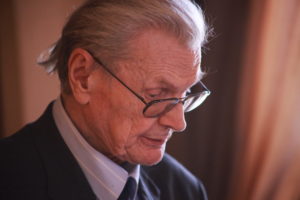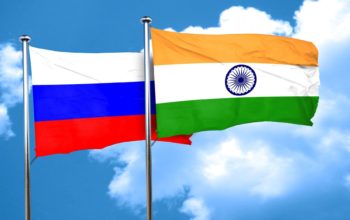
Grand Doctor of Philosophy, Doctor of Philological Sciences, Professor, Academician Andrei. N. Iesuitov
EXPLAIN THE WORDS
In A.S. Pushkin’s poem ‘The Prophet’, the ‘six-winged Seraphim’ plucked from the False Prophet’s mouth the ‘idle and sly tongue’ and put into his mouth ‘the sting of a wise serpent’. Let us not subject even metaphorically to such a painful operation people with ‘idle and wicked tongue’. Snakes also come in many forms, including very poisonous ones with a deadly tongue.
At the same time, ‘idle and deceitfulness’ in the language does indeed manifest itself at the present time.
Let us turn to other authorities in this connection. K. Marx regarded language as ‘the immediate reality of thought’. Р. Descartes called for an ‘explanation of words’ in order to ‘rid the world of delusions’. F.I. Tyutchev argued that ‘a thought uttered is a lie’. There is a well-known expression: Cogito ergo sum – ‘I think, so I exist’. B. Pascal believed that ‘our dignity is in thought’. A.I. Kuprin wrote that ‘thought is immortal’.
For the ‘Philosophy of Interaction (’bialism‘)’ (PV), a number of fundamentally important conclusions follow from all this.
Thought has a linguistic (verbal) expression. Thought can be thought and exist in different ways. Thought receives its dignity by being verbally precise by its expression. It is the explanation of words that saves human thought from delusion. Who speaks and writes inaccurately, thinks and acts not in accordance with the reality, material and spiritual, which leads to serious theoretical and practical errors, essential for mankind, everyone.
Thought theoretically and practically realises itself in a certain idea, which is the interaction of thought and feeling expressed verbally.
In connection with all of the above, there is an urgent need to create a Concise Terminological Explanatory Dictionary, which, from the point of view of FV, includes the most frequently and at the same time arbitrarily used at present various fundamentally important terms, which are given an inaccurate and biased interpretation that does not correspond to reality, material and spiritual.
The FV gives a principled explanation of these terms, thus philosophically and linguistically motivating the multifaceted process of creating a world without violence, material and spiritual.
So, let us begin our Dictionary. The terms are arranged in it alphabetically.
Aggression (from Latin aggressio) etymologically means attack, offensive way of action, which allows for a rather broad interpretation of aggression and its various types. At the same time, everywhere and anywhere aggression is interpreted as an attack. Meanwhile, aggression is interpreted by some modern politicians as a special kind of defence, defence of one party against an assumed attack on it by the other party. Assumption is not identical to a real attack, which actually disturbs the peaceful state between countries. Aggression can in no way in any form lead to the establishment of peace without violence. The course of aggression is disastrous for those who have chosen it and impose it on others.
Adequacy (from Latin adaequatus) etymologically means equating, identity, material and spiritual, and one phenomenon is recognised as similar to another phenomenon, almost identical to it. When one calls for an adequate response to terrorism, it actually means to be a terrorist oneself. Such a peculiar reincarnation is hardly conducive to a world without violence.
Ambitiousness (from Latin ambitio) etymologically means unreasonableness, absurdity, conceit, arrogance. Meanwhile, ambitiousness is often seen as the greatness of plans, the grandiosity of achieved successes, the conditions of rapid development and obtaining huge positive results. Such ambition is, in fact, at least futile, and it does not contribute in any way to the creation of a world without violence.
Virtuality (from Latin virtualis – possible) etymologically means not something that should and can manifest itself under certain conditions. It is a special spiritual reality that is not created by anyone and nothing and becomes directly and sensually perceivable, existing outside and independent of man.
Genocide (from Greek genos – genus plus Latin caedere – to kill) etymologically means destruction of clan and tribe, and historically later of ethnos and nations by each other. There is a conscious extermination of one nation by another nation. Genocide is the Holocaust. At the same time, the extermination of a people or the population of a certain region consisting of several nations cannot be considered genocide. Genocide is the destruction of one nation by another nation, not a people, because a people can be composed of several nations. This must be kept in mind when accusing any country or state of genocide.
Geopolitics (from Greek geo – earth + from Greek politike – state management) etymologically means not a worldwide aggressive and conquest policy, but in principle a foreign and different policy towards separate regions and the world as a whole. It is precisely a different and multifunctional policy.
Identity (from Latin identicus) etymologically means sameness, similarity to something or someone, rather than exclusive superiority, incomparable authenticity. In fact, countries are both similar and different in their existence and development. With a conscious attitude to identity, it is in principle nowhere and in nothing possible for any real phenomenon, material and spiritual, to be truly original.
Integration (from Latin integratio – restoration, replenishment) etymologically means not just the unification of any parts, but the adaptation of the parts to each other and their recognition of the leading role of the whole standing above them in relation to the unifying parts. This is not sovereignty. One should also bear in mind that a part of any phenomenon included in the whole does not genetically become its part, material and spiritual.
Inflation (from Latin inflatio – inflating, inordinate growth) etymologically means uncontrolled growth of paper money by the state, which leads to the impoverishment of workers. This is the case in macroeconomics, when the overall growth of paper money, regardless of who owns it, is considered an achievement. This has a real effect on the standard of living of workers, reducing their consumption abilities, who do not have much capital. Inflation is temporary and varies from country to country. The actual financial and economic potential of a country is measured by the purchasing power of its working population (microeconomics). The interaction of macroeconomics with microeconomics, their partial interchange into each other contributes to the creation of a world without violence.
Artificial intelligence (from Latin surrogatus – only partially replacing by itself + from Latin intellectus – human thinking ability) etymologically means not an analogue of natural human intelligence, although in some limited actions artificial intelligence even surpasses natural intelligence. In principle, artificial intelligence is a very relative imitation of natural intelligence and in principle is not capable of replacing it, much less completely. It is not by chance that the real time of creation of artificial intelligence is always referred to the future, and when exactly it will be created is not specified in any way.
Conservatism (from Latin conservatio) etymologically means commitment to preserving the existing and restoring the outdated, hostility to all innovations. Unconditional acceptance of conservatism leads to an obvious stagnation in development, material and spiritual, and even a return to the past, which has ceased to be constructive.
Consolidation (from Latin consolidatio – together + consolidare – to consolidate) etymologically means close unification of different countries for military-aggressive or peaceful purposes. Consolidation for peaceful purposes promotes peace without violence.
Corruption (from Latin corruptio – bribery, venality) etymologically means bribery, venality of power at all levels and in all its manifestations, material and spiritual. It is considered an inviolable position that money decides and opens everything. It is really impossible to do anything without a bribe, and what has been done must be justified. Overcoming corruption of any power should start from itself, from its own level, i.e. the power in no case should neither take nor give money.
Multipolarity (from Russian: много – more than one + from Latin polus, ‘bi’ from Latin: two – more than one + polus – ‘axis’ with two ends). ‘Multipolar world’ is essentially a ‘bipolar’ world, i.e. with two ‘geopolitical’ poles. An ‘axis’ cannot have many pole-ends, i.e. more than two. Many means more than one, and more than one is exactly ‘bi’ (two). ‘Multipolarity’, as it is now interpreted by many, is not conducive to a world without violence. Moreover, some countries intend to use multipolarity to settle their scores with other countries they consider their adversaries. Naturally this is not conducive to a world without violence.
Regions and even individual countries that geopolitically and economically gravitate to one of the two real poles often call themselves ‘poles’. Currently, these are the People’s Republic of China and the United States.
National interests are considered to be inherent to any essentially multinational country and multinational people. In relation to a multinational country and a multinational people, it thus turns out to be the interests of a certain nation, which actually borders on nationalism, which, in turn, can lead to ideological neo-Nazism. We should speak not of national interests, but of the interests of the state and the interests of all the people inhabiting a given country.
Pragmatism (from Greek pragma – deed, deed) etymologically means in politics a conscious orientation towards obtaining concrete and practically positive results, which at the same time have a relatively private nature. Pragmatism, to some extent, promotes peace without violence.
Realism (from Latin realis – real in a broad sense, as unimaginable, actual, accessible and independent of one’s perception, direct and mediated) etymologically means in politics the thinking and actions corresponding to reality, material and spiritual, and to the essential human needs, material and spiritual. Directly and indirectly, realism contributes to the formation and establishment of a world without violence.
Region (from Latin regio – area, part) etymologically means a group of neighbouring countries that together form a special economic and geographical area of the world. An individual region is not and cannot be a ‘pole’ for the whole world.
Remission (from Latin remissio – cessation) etymologically means a moderate weakening of economic development, is temporary in the material and spiritual sense. In reality, it does not contribute to the establishment of peace without violence.
Sanction (from Latin sanctio – approval by the supreme authority of an action) etymologically means an inviolable decree, legally justified as a temporary and relatively private punishment, material and spiritual, imposed by the supreme authority on a country or countries violating international law. In doing so, it may not coincide with the right that a State grants to itself, placing it above international law and thus justifying legal arbitrariness in the world. The purpose of sanctions is not for countries to mutually punish each other because of mutual animosity. Sanctions are fundamentally designed to encourage an individual country or a number of countries to embark on a path that leads to peace without violence.
Separatism (from Latin separatus – divided) etymologically means that a part of the state, which has separated from it, pretends its interests and aspirations for the interests and aspirations of the state as a whole. In this case, the state protects its own interests, substituting the people for its true interests. All this does not in fact contribute in any way to the establishment of peace without violence.
Stability (from the Latin stabilis) etymologically means stability, which can be of different nature, both conservative and constantly developing, progressive. It is progressive stability that promotes peace without violence.
Stagnation (from the Latin stagnum – standing, frozen) etymologically means stagnation and immobility, primarily in the economy, and at the same time it is temporary in nature.
Sovereignty (from German Souveränität – independence) etymologically means non-interference in internal affairs and actions towards one state by any other state or a number of states – material and spiritual interference. Such non-interference has a positive character. At the same time, in a certain sense, non-aggressive intervention as a kind of exchange of mutually useful historical experience between states, material and spiritual, can also be positive. Absolute sovereignty leads to self-isolation, which hinders the progressive development of the country. Sovereignty is proposed to be defended exclusively by military means, which does not contribute in any way to the establishment of peace without violence.
Digitisation (from Arabic, Polish cyfra – a conventional sign to denote a number) etymologically means the complete replacement of man by a number, in which his spirituality is relatively poorly represented in all kinds of human activity, in which spirituality in all systems and structures is dominant and determinant. Such an attempt to completely replace the human being with the digital is philosophically untenable. No digitalisation can replace human activity of a material and spiritual nature. Digitalisation creates a kind of ‘surveillance’ and ‘digitalisation concentration camp’. In fact, digitalisation does not contribute in any way to a world without violence, although it can replace some relatively primitive functions related to numerical determination and choice of options.
Elite (from French élite – the best, the chosen) etymologically means a set of any outstanding representatives of any part of society, engaged in material and spiritual activities. Nowadays it is more correct to speak and write not about elite as a phenomenon and concept, but about plutocracy (from Latin plutokratia – power of the rich). It is the plutocrats who own and dispose of wealth in modern conditions, in fact the entire material-economic and spiritual-creative life of society. Power is subordinated to plutocracy. It is time to put an end to this, which clearly prevents the creation of a world without violence.
The interaction and partial transition of such phenomena as adequacy and identity, integration and geopolitics, conservatism and stability, stagnation and remission into each other is already quite clearly visible. However, this interaction is negative, as the components themselves are distorted and one-sidedly limited in their interpretation.
Naturally, this Concise Dictionary of Terminology can be continued and refined. Such a right is reserved by the FS, philosophically and linguistically motivating the vital necessity of creating a world without violence. Humanity is now facing a choice as to which path it will choose: military or peaceful. This must be decided by all people and each person for himself. The peoples of the world undoubtedly choose a world without violence, material and spiritual.
04.03.2024
St. Petersburg



